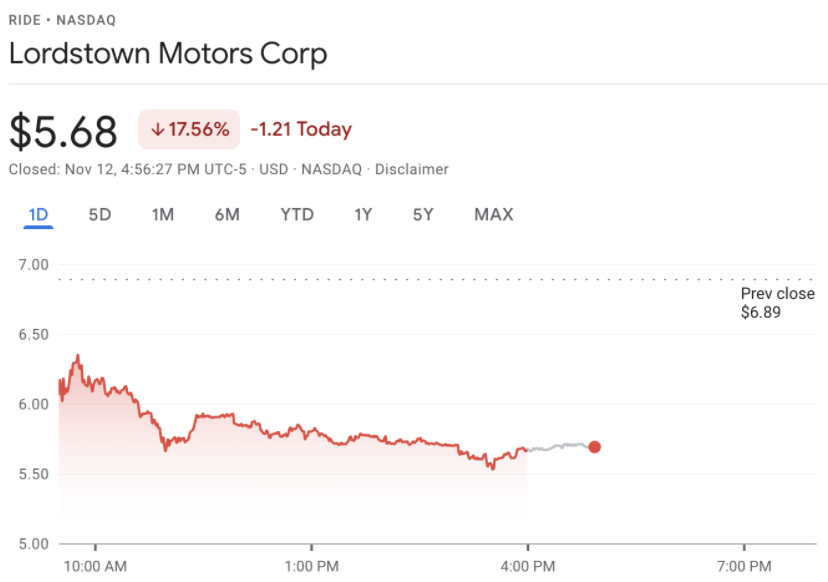Ride or die
-looking more like die at this point

Shares of beleaguered EV start-up Lordstown Motors (RIDE) got hammered during Friday’s trading session, closing the day down 17.56%. This coming on the heels of a 24% rally Thursday, which analysts have attributed to the Rivian effect. Rivian (RIVN), the Amazon and Ford backed EV start-up, IPO’d Wednesday and closed Thursday’s trading session up 23%. Unlike Rivian, Lordstown’s rally would be short-lived as the stock came crashing back to Earth Friday following Q3 earnings.
- Lordstown posted a Q3 loss of $0.54/share vs. analysts’ estimates of a loss of $0.62/share. That’s the good news if you can call it that.
- The bad news…the company delayed the launch of its first vehicle until the second half of 2022. Oh, and the Street was expecting Lordstown to report revenue of $26.47M, but the company had none. You read that right. Zip, zero, zilch in the revenue column.
- The company was also downgraded by BTIG analyst Gregory Lewis which means Lordstown stock has zero buy ratings on the Street.
- Lordstown did strike a deal with Taiwanese contract manufacturer Foxconn for $230M in cash, which helps a lot when a company makes zero dollars in revenue.

Lordstown’s situation is not a pretty one. That said, it is about 22% off its 52-week low and from a technical standpoint, has plenty of room to run to the upside. If the company can continue to improve its cash position, they should be able to start production in the near future. The EV industry continues to be red-hot so keep an eye on RIDE and any news regarding their finances.
A bubble about to pop

Amid a tide of euphoric sentiment for a market that’s hit all-time highs, more and more analysts fear a looming stock market crash. Though last Wednesday’s CPI report rained on the market’s parade a little, driving the value of oil and crypto lower with an inflationary wave of negative consumer sentiment, tech, and communications stocks pulled out umbrellas and weathered the news just fine.
- While it may be easy for some to get wrapped up in the wild optimism of the tech sector, the more shrewd investor (or those with internet access and subscription to The Daily Setup) would note that US consumer sentiment has dropped to a 10-year low. This is due in part to the Fed’s perceived inability to combat “transitory” inflation. The problem has become so visible that even Biden woke up from his nap and noticed, claiming “it is definitely a problem and I’m totally gonna do something about it.”
- That’s not the only troubling disparity. Morgan Stanley analysts have warned that the difference between the federal funds rate and the CPI is the largest ever and that this kind of gap is a recipe for asset bubbles…
- …Which sounds like a more and more reasonable fear when you learn that the S&P’s current market capitalization is 177% of the U.S. GDP. For context, right before the tech bubble popped in 2000, the S&P’s cap was just 121% of the national GDP. In other words, the bigger they are, the harder they fall.

This leaves us with quite the debacle. While stocks, being fueled by excess liquidity and the Fed’s current tact towards rate hikes, may make passive investing in the S&P 500 quite the tantalizing prospect, the potential for a 50% valuation drop for the index could complicate such a strategy. If this possibility has you on edge, you could turn to ol’ faithful and spot gold. After all, if it’s good enough for medieval kings and the Vatican, it’s probably good enough for you.
All the Cool Kids Are Doing It

The first half of November has seen more breakups than a Katherine Heigl movie. Divestitures are the hot new thing as managers discover that splitting up companies into smaller pieces is way easier than actually managing them. Toshiba is the latest corporate Lloyd Dobler and has announced a plan to split into three companies in an attempt to stave off activist investors. $TOSBF gained 3.60% on the news.
- The move is uncommon in Japan, where conglomerates are the norm, but follows recent breakup announcements from General Electric (GE) and Johnson & Johnson (JNJ).
- The three companies would be Energy & Infrastructure, Hard Disks & Semiconductors, and Flash Memory Chips & Other Assets.
- Toshiba has been mired in crises for years, from an accounting scandal in 2015 to a Chapter 11 filing in 2017 to a second bite at the accounting irregularities apple in 2020.

A company spokesperson said that Toshiba would have elected to break up regardless of the rumblings from unhappy investors. Right. If you believe that then you should probably respond ASAP to that email from the nice Internet prince offering you a reward for helping him unfreeze some assets.